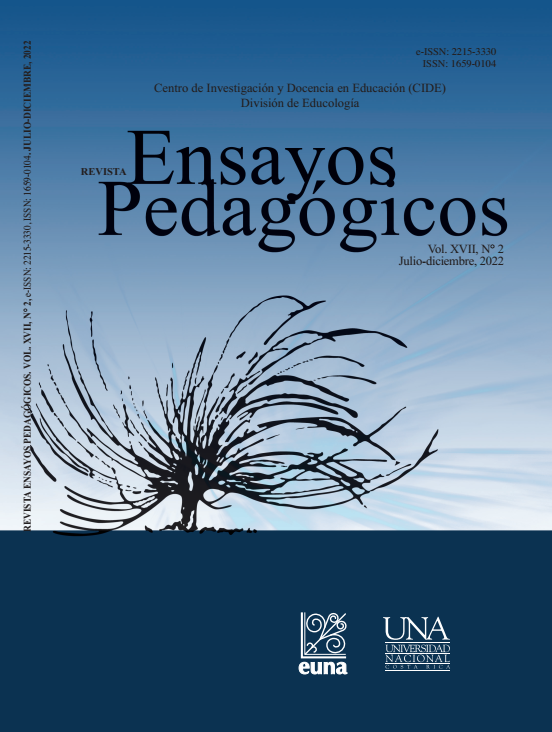Assessment of a Virtual Synchronous Evaluative Experience in Physics Learning to Promote Student Academic Honesty at Universidad Estatal a Distancia, 2020-2022
DOI:
https://doi.org/10.15359/rep.17-2.15Keywords:
assessment, academic honesty, Physics teaching, synchronous and distance educationAbstract
The purpose of this study was to assess the actions taken by the Physics Chair of the Exact and Natural Sciences of the Distance State University of Costa Rica regarding the implementation of evaluative activities which promote academic honesty, using an oral test with a virtual and synchronous format in a subject. Therefore, research was carried out with a qualitative approach, a narrative design and with a descriptive scope. The period of analysis covered the three academic quarters of the years 2020-2021, as well as the first quarter of 2022. Likewise, a group session was held with all the teachers who participated in the subject of Physics during the study period to find their perceptions about the evaluation activity in such a way that, based on these results and the advantages and disadvantages mentioned, adjustments were made in the synchronous oral test as part of a continuous improvement in the applied evaluation. In addition, the main conclusions show that the application of the virtual synchronous evaluation strategy encourages collaborative work and promotes academic honesty.
References
Alzate-Ortiz, Faber y Castañeda-Patiño, J. C. (2020). Mediación pedagógica: Clave de una educación humanizante y transformadora. Una mirada desde la estética y la comunicación. Revista Electrónica Educare, 24(1), 411-24. https://dx.doi.org/10.15359/ree.24-1.21
BID. (2010). Ciencia, tecnología e innovación en América Latina y el Caribe. Banco Interamericano de Desarrollo. https://publications.iadb.org/publications/spanish/document/Ciencia-tecnolog%C3%ADa-e-innovaci%C3%B3n-en-Am%C3%A9rica-Latina-y-el-Caribe-Un-compendio-estad%C3%ADstico-de-indicadores.pdf
Bonwell, C. y Eison, J. (1991). Active Learning: Creating Excitement in the Classroom. The George Washington University. https://files.eric.ed.gov/fulltext/ED336049.pdf
Calderón, Y. (2017). Valoración de las implicaciones éticas, sociales y didácticas de la evaluación de los aprendizajes apoyada en entornos virtuales [Tesis de maestría no publicada]. Universidad de Costa Rica, San José, Costa Rica.
Clementi, L. A. (2013). Física moderna y sus aplicaciones. Ed. de la Universidad Tecnológica Nacional.
Crenshaw, D. (2015). Feminist Physics Education: Deconstructed Physics and Students’ Multiple Subjectivities [Tesis de doctorado, Columbia University]. Academic Commons. https://doi.org/10.7916/D89G5KW7
Dari, N. L.(2004). Reseña de "Aprender en la virtualidad" de Josep M. Duart y Alber Sangrá. Ciencia, Docencia y Tecnología, 15(28), 263-266. https://www.redalyc.org/pdf/145/14502812.pdf
Durán R. (s. f.) ¿Qué es el ciberplagio? https://www.academia.edu/6939203/_Qu%C3%A9_es_el_ciberplagio
García, C. (2010). Evaluar lo oral. Enunciación, 15(2), 103-13. https://doi.org/10.14483/22486798.3163
Gil, D., Martínez, J. y Senent, F. (1988). El fracaso en la resolución de problemas de física: una investigación orientada por nuevos supuestos . Enseñanza de las Ciencias: Revista de Investigación y Experiencias Didácticas, 6(2), 131-146. https://raco.cat/index.php/Ensenanza/article/view/51079/92749
González, A. (2013). ¿Por qué se percibe la física como muy complicada? UNICEN. https://www.unicen.edu.ar/content/%C2%BFpor-qu%C3%A9-se-percibe-la-f%C3%ADsica-como-muy-complicada
Herrera, E. del C. y Sánchez, I. R. (2019). Uso de la Uve de Gowin en el diseño de prácticas de laboratorio en Física. Revista Espacios, 40(23), 21. http://www.revistaespacios.com/a19v40n23/19402321.html
Johnson, A. (2020). An Intersectional Physics Identity Framework for Studying Physics Settings. En A. J. Gonsalves y A.T. Danielsson (Eds.), Physics Education and Gender (pp. 53-80). Springer. https://doi.org/10.1007/978-3-030-41933-2_4
Laws, P., Sokoloff, D. y Thornton, R. (1999). Promoting Active Learning Using the Results of Physics Education Research. UniServe Science News, 13, 14-19. https://citeseerx.ist.psu.edu/viewdoc/download?doi=10.1.1.454.1301&rep=rep1&type=pdf#page=14
Matthews, M. (2015). La enseñanza de la ciencia, un enfoque desde la historia y
la filosofía de la ciencia. Fondo de Cultura Económica.
McDermott, L. C. y Redish, E.L. (1999). Resource letter: PER-1: Physics education research. American Journal of Physics, 67(9), 755-767. https://doi.org/10.1119/1.19122
Morán, H. M. (2016). El plagio en la vida académica universitaria. Universidad Ricardo Palma. https://www.urp.edu.pe/pdf/id/4279/n/moran-hector-el-plagio-en-la-vida-academica-univeristaria-2016-ii.pdf
Moreira, M. A. y Greca, I. M. (2003). Cambio conceptual: análisis crítico y propuestas a la luz de la teoría del aprendizaje significativo. Ciência & Educação, 9(2), 301-315. https://doi.org/10.1590/S1516-73132003000200010
Pastor, C. (2008). Sobre el diseño de pruebas orales. Instituto Cervantes Múnich. https://cvc.cervantes.es/ensenanza/biblioteca_ele/publicaciones_centros/PDF/munich_2006-2007/08_pastor.pdf
Romero, A. (2013). Las estrategias de aprendizaje y la física. Vida Científica: Boletín Científico de la Escuela Preparatoria No. 4, 1(2). https://repository.uaeh.edu.mx/revistas/index.php/prepa4/article/view/1783
Sánchez, A., Pérez, G. y Martínez-Torregrossa, J. (1996). Evaluar no es calificar. La evaluación y la calificación en una enseñanza constructivista de las ciencias. Investigación en la Escuela, 30, 15-26. https://revistascientificas.us.es/index.php/IE/article/view/8060
Serrano, J. L. y Prendes, M. P. (2012). La enseñanza y el aprendizaje de la física y el trabajo colaborativo con el uso de las TIC. Revista Latinoamericana de Tecnología Educativa. 11(1), 95-107. https://relatec.unex.es/article/view/825/629
Solano, W. y Campos, J. (2012). La deshonestidad académica en la UNED: estrategias de detección, abordaje y prevención. Un acercamiento a la construcción del discurso. EUNED
Universidad Estatal a Distancia (UNED). (2005). Modelo Pedagógico UNED. https://www.uned.ac.cr/academica/images/igesca/materiales/24.pdf
Universidad Estatal a Distancia (UNED). (2011). Plan de Desarrollo Institucional: para el fortalecimiento de la educación a distancia (2011-20115). https://www.uned.ac.cr/viplan/images/cppi/Plan_de_Desarrollo_Institucional_2011-2015.pdf
Universidad Estatal a Distancia (UNED). (2012). Plan de Desarrollo Académico 2012-2017. https://www.uned.ac.cr/academica/plan_academico/insumos/PlanDesAcad_UNED_final.pdf
Whitten, B. y Burciaga, J. R. (2000). Feminist and Multicultural Pedagogy in Physics: A Status Report. Women's Studies Quarterly, 28(1), 213-235. http://www.jstor.org/stable/40004456
Published
How to Cite
Issue
Section
License
Ensayos Pedagógicos is subscribed to the Attribution-NonCommertial-NoDerivatives 4.0 International Creative Commons Licence, which allows both authors and readers to freely download, store, copy, and distribute the final approved publisehd version of the manuscript (post-print) as long as this is done without commercial purposes, no derivative works are generated, and the source and author are mentioned. As well, Ensayos Pedagógicos declares that authors will remain the rightful owners of the copyrights of their work in perpetuity.







